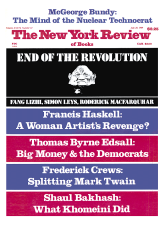In response to:
Goldwynism from the May 18, 1989 issue
To the Editors:
John Gregory Dunne’s essay on Goldwyn and other books about Hollywood [NYR, May 18] is filled with interesting insights and a broad range of movie history. To keep the history straight, it is worth noting that although William Wyler directed “The Memphis Belle” about a bomber crew in Europe, he did not direct the Oscar winning film, “The Fighting Lady.” It was a documentary of the Pacific war supervised by Commander Edward J. Steichen, U.S.N.R.
The remark Mr. Dunne attributes to an anonymous director at the special meeting of the Directors Guild during the move to recall Joseph L. Mankiewicz was made by my father, who led the defense of Mankiewicz. As my father told it to me, it went like this: DeMille: “I’d like to know where you were when we were fighting to keep the Reds out of the Unions.” Stevens: “C.D….I was up to my ass in mud at Bastogne while you were in Hollywood fighting the battle of capital gains.”
George Stevens, Jr.
Washington, DC
John Gregory Dunne replies:
I am indebted to George Stevens, Jr., for his correction regarding The Fighting Lady, and will forward it to the publishers of The American Cinema, the film source book that contained the misinformation (p. 167) I appropriated. Thanks also to Mr. Stevens for his amplification on the legend surrounding the Mankiewicz recall. “When the legend becomes the fact,” as the character said in John Ford’s The Man Who Shot Liberty Valance, “shoot the legend.”
In that same piece I quoted Dwight Mac-donald’s slighting aside on Hollywood producer-director Mervyn LeRoy. “It is rumored,” Mac-donald had written, “that his real name is Lasky.” I was recently informed by Mervyn LeRoy’s son-in-law, Morton Janklow, that LeRoy’s real name was Levy, not Lasky. According to Janklow and his wife, Linda LeRoy Janklow, Mervyn LeRoy as a child performer was half of a two-piano team billed as “Levy & Cooper, Two Kids & A Piano.” When the pair arrived for a performance in a small Montana town, they discovered that the local impresario had arbitrarily changed the team’s name to LeRoy & Cooper, on the theory—untested—that Montanans would not pay money to see a Jew named Levy. Thus Mervyn Levy became Mervyn LeRoy.
This Issue
July 20, 1989



